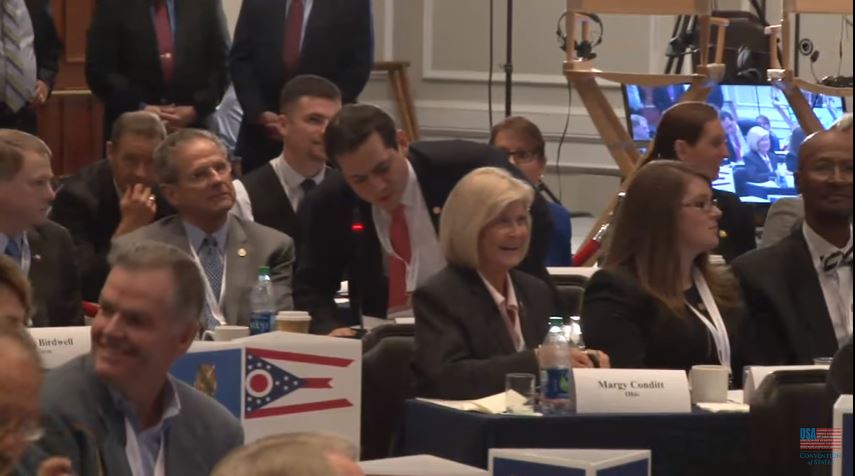By Mike Kapic – March 19, 2022
In our hunt for liberty, we must return to our Founding Charters of Freedom in order to understand how far we have drifted from Divine Law and into secular social contract theory. Claims today by the John Birch Society, Eagle Forum, CommonCause and others that America was founded illegally is but fiction, a myth, not based in the reality of history. If it were, they would show us the records—but the recorded history read just the opposite. Nealy 700 individual convention records report the truth of 400 years of the people meeting to solve issues that their legislators could not. We’ve done this before!
Part IV briefly illustrates the myths and the truth of their false assertion. Later in this series, proof via the resources will be published for you to validate.
Article V ‘runaway’: A Brief Explanation
A few claim that Article V’s “…shall call a convention for proposing amendments…” could lead to a bad “runaway.” An historically false narrative.
The “runaway” originated in 1951 by US Rep Patman (TX-D) attacking the attempt to repeal the 16th Amendment by state convention. He coined, it could “rewrite the whole Constitution,”
The term “constitutional convention” is not found in any 18th or 19th century state application or any court decision.
The claim is called the “runaway Scenario” and has almost no basis in history or law, needlessly frightening Americans. Madison noted our Constitution was unique and, “it was incumbent on their successors to improve and perpetuate.”
Progressives needed to neutralize the Article V movement to protect their Court & government expansion gains.
In 1901 a congressional staff compiler gave the erroneous title “constitutional convention” to a state legislative resolution, and after 1903, a few resolutions actually used that term instead of amending convention.
Of over 650 recorded conventions over 400 years, no evidence of a ‘run away’ can be found.
The principle of Article V is for the people, through their states, to bypass their governor, the President, and Congress (except to set the date and place) to PROPOSE changes to the Constitution’s blueprint of their government.
Article V’s second clause insured that Congress could not control the process of repairing a dysfunctional government.
What changes at an amendatory convention? Nothing: It only proposes, debates, votes, and forwards results.
Congress has attempted 12,150 amendment proposals with 33 being sent to states of which 27 have been approved.
If a ‘runaway’ were possible by the states, why hasn’t Congress also ‘runaway’ and changed the Constitution on its own?
The Electoral College and Article V conventions are controlled by states, yet the EC has not been accused of a “runaway.”
Since 1791, Congress has received enough state applications to have called eleven conventions & yet ignored them all.
Arguing against an Article V convention disables one of the Founders constitutional checks on bad government.
Conventions were held in the founding era, on average every 3 ½ years, codifying the process into the Constitution.
There is widespread support for amendments such as term limits and tax/spending constraints that Congress is not motivated to propose through Article V’s first clause, leaving the second clause as the only solution.
The Bill of Rights & Article V’s first two clauses protect Americans from government. Article V’s second clause protects we the people from Congress.
Article V is a federalism feature of the states to check the national government.
Congressman Larry McDonald (GA), JBS Chairman, led an attempt by both clauses of Article V when he died in a plane crash. Known as the Liberty Amendment, it is in the House Congressional Record— Oct 9, 1975
Runaway prospects: Article VII & 21st Amendment ratification (52 conventions), 1814 & 1861 produced amendments.
The claim that only Congress should amend the Constitution because the convention process has never been used, ignores the scholarly and historical analyzed records of 400 years.
For more: see The Article V Library
Also: Let Us Vote 4 BBA (The subject of which has been renamed the FRA or fiscal responsibility amendment)


Bill, now that you mention it, I couldn’t find those ‘illegal’ words in the JBS book, ‘What Is A Constitutional Convention’ either. But the ‘illegal’ line has been written and spoken by ranking members of JBS. This book, by the way, goes out of its way to misrepresent the Constitution by self-editing the sentences to fit a different narrative, thereby leading to misleading information. As Scalia and others have noted, the original words are important if not critical to understanding the Freedom Charters. I have to ask too, rhetorically, why hasn’t JBS or Eagle Forum et al, picked other aspects of the Constitution or Declaration to not like or appreciate?
Thanks for reading.
I agree with you Mike, the term “runaway” as it applies to a convention of states is a misnomer. The states can propose anything, including a completely new constitution.
As a former JBS member, I surely don’t recall ever hearing or reading in their literature that “America was founded illegally”. Our present constitution does seem to have come to be through a “coupe’ or takeover” by forces, but it was not illegal.
Lastly, just a comment on your question, “If a ‘runaway’ were possible by the states, why hasn’t Congress also ‘runaway’ and changed the Constitution on its own?” Could it be that Congress, just as the States, also have no authority or the fact that we seem to be content to let the SCOTUS change the constitution through interpretation.
One could come to the conclusion here that the only thing “runaway” here is the gov’t in general.